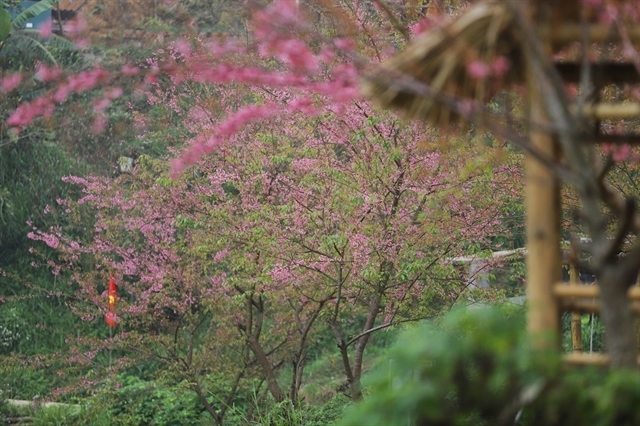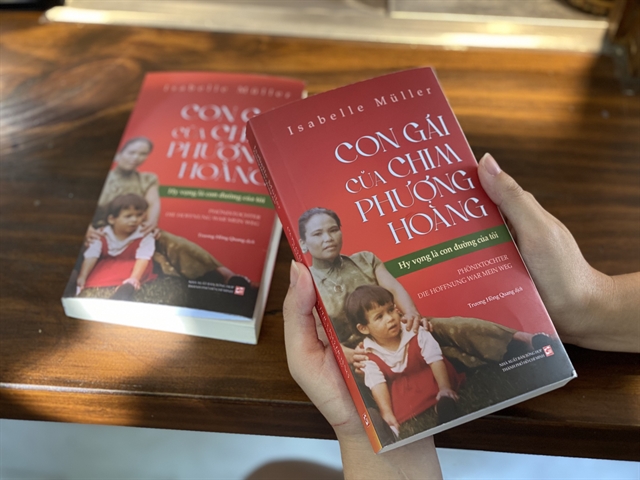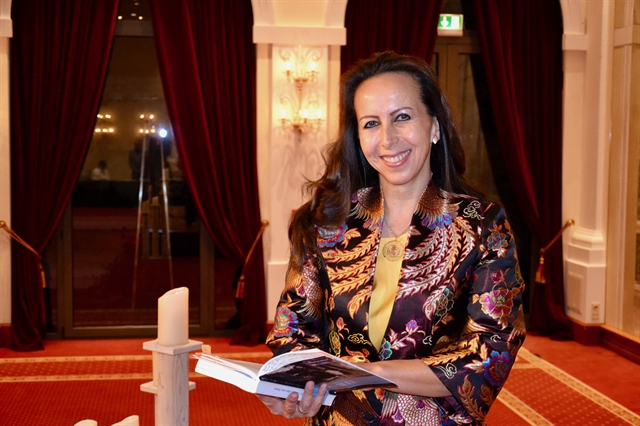 Features
Features

'Phoenix's Daughter - Hope Was My Way' tells the story of an outstanding woman with Vietnamese blood running through her veins who has defied all constraints of fate to become a successful businesswoman in Germany.

|
| ‘Phoenix Daughter - Hope Was My Way’ gives readers strength, hope, positive energy and courage to live for the future. Photo courtesy of Hồ Chí Minh City General Publishing House |
By Lương Thu Hương
Vietnamese-German writer Isabelle Müller is often asked if she wrote her memoir Phoenix Daughter – Hope Was My Way as therapy to deal with past trauma.
Her answer is clear: “Definitely not.”
The essence of this book is not the suffering that she has experienced in life, but what the suffering has made her: a happy and strong person.
“I want to share the transformation of suffering into happiness with readers,” she tells Việt Nam News.
Released by S. Fischer Verlag in Germany in 2009, the book tells the story of an outstanding woman with Vietnamese blood running through her veins who has defied fate to become a successful businesswoman.
The memoir published by the Hồ Chí Minh City General Publishing House, translated into Vietnamese as Con Gái của Chim Phượng Hoàng: Hy Vọng Là Con Đường của Tôi by translator Trương Hồng Quang, will be officially introduced to Vietnamese readers on March 19.
Readers in Europe and North America can pre-order the books via Happy Bookstore. A part of the profits will be donated to the LO-ANH (LOAN Stiftung) Foundation initiated by Müller to support disadvantaged children in Việt Nam.
Müller was the fifth child of a Vietnamese mother and a French father, growing up in abject poverty in a French village in the 1960s. Her father was a sadist, and she was raised in a heavily racist environment.
However, Müller did not give up where others might have fallen. She inherited from her Vietnamese mother, Loan (Lo-Anh), the will to live and the courage to keep moving forward, even when life seemed unbearable.
The story of Müller’s life gives readers strength, hope, positive energy and courage to live for the future. It encourages people to question life and themselves, again and again, to conquer their own fears and believe in their dreams.
It shows how just because some things have always been a certain way, they do not have to stay that way.
“Life is a constant process. Nothing stops. Everyone and everything evolves. By regularly questioning something, you can determine whether everything is right in your life. Whether the things that fill your own life, the environment, the people make you happy. If not, it’s time to act and make a difference," Müller says.
"By doing it, you develop a healthy, strong psyche and can thus set good impulses in society, possibly also in the world. You should always listen to your intuition.”
Müller’s memoir helps to seek happiness by turning unhappiness into happiness.
“It’s about learning to turn the spiral of negativity into a spiral of positivity. It is all experiences from my philosophy of life. That philosophy is the essence of a happy life, I mean,” she says.
However, she has had many bad experiences, including sexual abuse, psychological terror, burn-out, exclusion, discrimination, poverty, and betrayal.
At the request of the German publisher, she was asked to leave out the toughest passages about longstanding sexual abuse as they could have been too harsh for readers to handle.
When the book was first published in Germany in 2009, it had a significant impact on society and the media. In 2010 a significant move against sexual abuse started in Germany, and it continues to this today.
Victims started to follow her example by speaking about their experiences and breaking the power of the perpetrators.

|
| In her book, Vietnamese-German writer Isabelle Müller shares the transformation of suffering into happiness. Photo courtesy of Hồ Chí Minh City General Publishing House |
Although there are difficult passages in the book, the focus is not placed on the pain, suffering and trauma that Müller experienced. Instead, it contains examples of positive experiences she has been through.
“I consciously say to myself: I have also experienced true love, warmth, affection, encouragement, a willingness to help, empathy, friendship, luck and happiness. And I am allowed to live healthy here on earth and help shape this life,” she says.
“This also implies being able to forgive. The power of forgiveness can work miracles. I experienced that myself and would therefore like to share this experience. The pain is a permanent imprint that must never be forgotten. But forgiveness is a liberating, redeeming decision that enables one to lead a happy, self-determined life.
“Ultimately, I would like to show my respect for the universe with my biography and express my gratitude for its guidance. In every second of loneliness, in each breath, I was always accompanied by the power of heaven. It is imperturbable and part of my life. I want the readership to gain strength for the future by reading my book.”
Phoenix Daughter – Hope Was My Way is Müller’s second book to be published in Việt Nam, after the success of her previous best-selling book about her mother, Lo-Anh – From the Life of a Phoenix released in Vietnamese in 2018.
“The special attraction of the book does not lie in its famous author but a part from the first book about the life of Đậu Thị Cúc, or Loan, the author’s biological mother, a Vietnamese woman with a life full of suffering and tragedies in France in the 1960s. However, a small but extremely great Vietnamese mother gave birth to an equally resilient daughter,” reader Trần Huyền Trang wrote on Facebook.
“If Loan is not a phoenix, reborn a life full of pride from the ashes – experiencing war crimes, could there be a strong ‘phoenix daughter’ who has bravely fought for women, calling on them not to be cowardly, be frightened or surrender but to be strong enough to break the pincers of those who bully them.
“The pages of the book are full of fascinating details like a slow-motion film. The footage, despite being in black and white, contains the most complete record of what is both tragic and beautiful.” VNS
IN BOX:
Isabelle Müller was born on May 25, 1964, in Tours, France.
After graduating from high school, she studied languages (German, English and Russian) at Francois Rabelais University (France) and the Centre d’Etudes Pratiques de Langues Vivantes (France).
Since 1985, she has worked in Germany as an interpreter and translator. Together with her mother, Đậu Thị Cúc (Loan), Müller travelled to Southeast Asia in the 1990s and learned about her Vietnamese roots.
In May 2016, the author established the Loan Stiftung charity fund, which specialises in educational projects for ethnic minority children in remote mountainous areas of Việt Nam.




